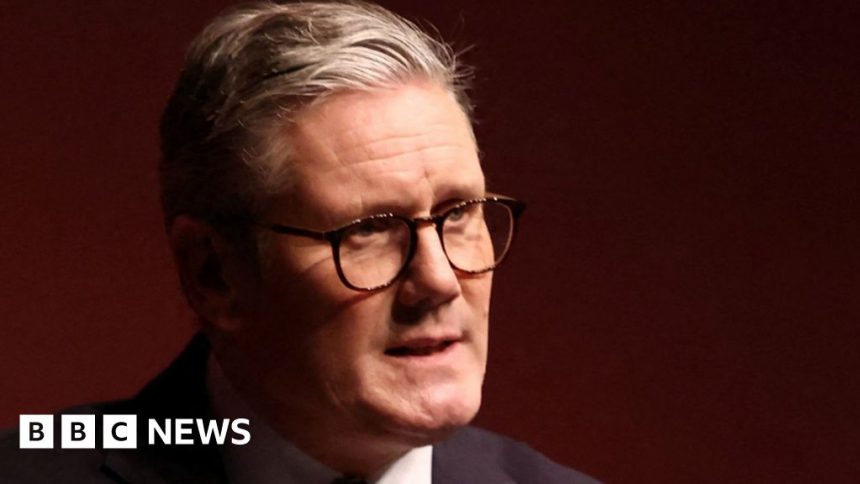Tax rises needed to avert austerity, Starmer says
The Budget will embrace the “harsh light of fiscal reality” but “better days are ahead”, Sir Keir Starmer has said in a speech ahead of Wednesday’s announcement.
Speaking in Birmingham, the prime minister said his government would take “tough decisions”, opting to raise taxes in order “to prevent austerity and rebuild public services”.
Although he did not set out many details of the Budget, he did say the £2 bus fare cap in England, which had been expected to end, would instead be replaced by a £3 cap, funded to the end of 2025.
He also announced £240m aimed at getting people back to work.
The Conservatives have accused Sir Keir of breaking Labour’s election promises on tax.
In its general election manifesto, Labour promised not to increase taxes on working people – explicitly ruling out a rise in VAT, National Insurance or income tax.
However, the pledge has recently come under renewed scrutiny with the party’s first Budget in 15 years expected to contain measures which could see taxes go up.
This includes an anticipated rise in the National Insurance (NICs) rate paid by employers, which some claim breaks Labour’s manifesto pledge, and an expected extension of the freeze on income tax thresholds beyond 2028.
Ministers have come under pressure to spell out who would be covered by its promise not to raise taxes on working people.
In his speech, Sir Keir did not shy away from using the phrase, telling the audience “the working people of this country know exactly who they are”.
He added that he would “protect the payslips of working people” who were “the golden thread” of the government’s agenda.
Sir Keir did not spell out what tax rises might be in the Budget, but repeatedly emphasised the need for “tough decisions” and spoke of “broader shoulders” carrying a “higher burden on tax”.
“Nobody wants higher taxes, just like nobody wants public spending cuts.
“But we have to be realistic about where we are as a country.
“This is not 1997, when the economy was decent but public services were on their knees. And it’s not 2010, where public services were strong, but the public finances were weak. We have to deal with both sides of that coin.”
Anticipating criticism following Wednesday’s Budget, Sir Keir said those who challenged the government’s approach should set out which taxes they would raise or which public services they would cut.
“The time is long overdue for politicians in this country, to level with you, honestly about the trade-offs this country faces. To stop insulting your intelligence with the chicanery of easy answers.”
He said he would not “continue the pretence that you can always have lower taxes and that your public services will run properly”.
His government’s Budget, he argued, would “prevent devastating austerity in our public services and prevent a disastrous path for our public finances.
“That is the reality of what would happen if we’d stuck to Tory spending plans.”
‘Terrible illusion’
Leading economists have warned that it will be workers who eventually pay for a rise to the rate of National Insurance paid by employers.
Paul Johnson, the head of the influential Institute for Fiscal Studies think tank, told the BBC’s Today programme that when employer National Insurance contributions go up, often they are “passed through to working people”.
He also suggested that in fact, employees might well be be more affected than self-employed people or small business owners by the potential change.
“Unless their taxes are raised in the same way that employer national insurance is going to be raised, that’s a very big tax rise that will effectively only impact workers,” he said.
The former Bank of England governor Lord King of Lothbury also said the debate about not putting taxes up for working people was a “terrible illusion”.
“Ultimately, they fall on the amount that people can spend and you only can raise significant amounts of money by raising taxes on most people, however you care to define that, but it’s most people will have to pay higher taxes,” he told Sky News.
Critics have argued that employees will also face a greater burden as the chancellor is expected to extend the freeze on income tax thresholds, which is currently due to end in April 2028 and sees people pulled into paying higher rates through a phenomenon known as “fiscal drag”.
The government is also reportedly looking at increasing tax on asset sales, such as shares and property, as well as changing its own self-imposed rules on how its debts are measured to free up money for spending on infrastructure projects.
Speaking to the Sunday with Laura Kuenssberg programme, Conservative shadow science secretary Andrew Griffith said Labour had “essentially lied to the British people in terms of their plans”.
He added that at a time when there was a “crisis of trust in politics”, they “behaved at the very least like the worst form of dodgy car hire firm, conjuring up small print that never existed”.
Liberal Democrat leader Sir Ed Davey said the previous Conservative government “unquestionably left our economy in tatters… yet the new government can not allow the burden of fixing this mess to fall on families and small businesses already suffering from past Conservative tax rises”.
He urged Labour to “look to the big banks, big tech companies and the oil and gas giants to raise the money needed”.

Sign up for our Politics Essential newsletter to read top political analysis, gain insight from across the UK and stay up to speed with the big moments. It’ll be delivered straight to your inbox every weekday.





